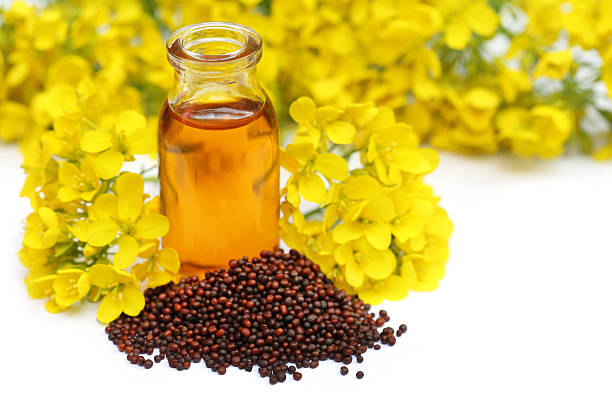
Mustard Seed Oil
Mustard Seed Oil: A Golden Elixir from India
Mustard seed oil, known for its pungent aroma and rich flavor, is an essential part of Indian cuisine and has a growing presence in international markets. Revered for its culinary versatility and numerous health benefits, this oil is derived from the seeds of the mustard plant, a crop widely cultivated in India. In this article, we will explore the origin, production, varieties, quality, and global appeal of mustard seed oil, highlighting its significance from an Indian exporter’s perspective.
Origin and Production: A Heritage of Excellence
Historical Significance
The use of mustard seed oil in India dates back thousands of years. It has been a staple in Indian kitchens and traditional medicine practices, valued for its therapeutic properties and robust flavor.
- Cultural Roots: Mustard oil has deep cultural roots in India, particularly in the northern and eastern regions. It is commonly used in traditional dishes, pickles, and as a massage oil in Ayurveda.
- Major Growing Regions: The primary mustard-producing states in India include Rajasthan, Uttar Pradesh, Haryana, Madhya Pradesh, and West Bengal. These regions provide the ideal climate and soil conditions for mustard cultivation.
Modern Production Techniques
While traditional methods hold significance, modern techniques have also been adopted to enhance the efficiency and quality of mustard seed oil production.
- Cold Pressing: This method involves pressing the mustard seeds at low temperatures to extract oil without losing nutritional value or flavor. Cold-pressed mustard oil retains its natural compounds and has a strong, pungent taste.
- Refining: Some mustard oils undergo refining to remove impurities and reduce the strong aroma. Refined mustard oil has a milder flavor and is often preferred for certain culinary applications.
Varieties of Mustard Seed Oil
Mustard seed oil is available in various forms, catering to different culinary needs and preferences.
- Cold-Pressed Mustard Oil: Extracted using traditional cold-press methods, this oil retains its natural nutrients and has a strong, pungent flavor. It is ideal for traditional Indian cooking and pickling.
- Refined Mustard Oil: This oil undergoes a refining process to remove impurities and reduce its strong aroma. It is suitable for frying, sautéing, and other high-heat cooking methods.
- Organic Mustard Oil: Produced from organically grown mustard seeds without the use of pesticides or synthetic fertilizers, this oil is favored by health-conscious consumers.
Quality of Mustard Seed Oil: Ensuring Purity and Potency
Maintaining the quality of mustard seed oil is crucial for meeting international standards and consumer expectations.
Factors Influencing Quality
- Soil and Climate: The quality of mustard oil is significantly influenced by the soil and climate in which the mustard plants are grown. Fertile, well-drained soil and moderate climate yield high-quality seeds with superior oil content.
- Harvesting Techniques: Proper harvesting techniques ensure that the mustard seeds are collected at the right maturity stage, preserving their oil content and flavor.
- Processing Methods: Cold pressing and minimal refining help retain the natural flavor and nutrients of the mustard oil. Avoiding excessive heat and chemical processes is key to maintaining quality.
Quality Control Measures
- Testing and Certification: Regular testing for contaminants, such as erucic acid, and adherence to food safety standards are essential. Certifications like ISO, HACCP, and organic certifications enhance the credibility and marketability of the oil.
- Packaging and Storage: Proper packaging in airtight containers protects the oil from oxidation and spoilage. Storing the oil in a cool, dark place extends its shelf life and preserves its quality.
Health Benefits: A Nutritional Powerhouse
Mustard seed oil is not only a culinary delight but also offers several health benefits.
- Rich in Monounsaturated Fats: Mustard oil is high in monounsaturated fats, which are heart-healthy fats that help lower bad cholesterol levels.
- Antibacterial and Antifungal Properties: The natural compounds in mustard oil, such as allyl isothiocyanate, have antibacterial and antifungal properties that can help protect against infections.
- Antioxidant Properties: The oil contains natural antioxidants, such as vitamin E, which help protect the body from oxidative stress and inflammation.
- Digestive Aid: Mustard oil can stimulate the digestive system and increase appetite, making it beneficial for those with digestive issues.
- Anti-inflammatory Benefits: Used in traditional Ayurvedic practices, mustard oil is known for its anti-inflammatory properties and is often used for massages to relieve muscle pain and arthritis.
Market Trends and Opportunities
- Health and Wellness: As consumers become more health-conscious, the demand for natural and minimally processed oils is on the rise. Mustard oil, with its nutritional benefits, fits well into this trend.
- Culinary Innovation: The versatility of mustard oil makes it an ideal choice for chefs and home cooks experimenting with new recipes and cuisines.
- Sustainable and Organic Products: There is a growing market for organic and sustainably produced oils. Indian exporters can capitalize on this by promoting organically grown and ethically produced mustard oil.
The Future of Mustard Seed Oil
The future of mustard seed oil looks promising, with a focus on innovation, sustainability, and quality. As global consumption continues to rise, Indian exporters are well-positioned to meet the evolving preferences of international consumers.
- Innovation: The introduction of new mustard oil blends, flavored oils, and ready-to-use products is expanding the market for Indian mustard seed oil.
- Sustainability: Emphasizing sustainable farming practices and reducing the environmental impact of mustard oil production is becoming a priority for many producers.
- Quality Assurance: Continued adherence to high-quality standards and certification processes ensures that Indian mustard seed oil maintains its esteemed reputation.
Conclusion: Embracing the Legacy of Mustard Seed Oil
Mustard seed oil, with its rich history, diverse varieties, and exceptional quality, is a valuable product in the global culinary landscape. From the fertile fields of India to kitchens around the world, this versatile oil continues to enhance flavors and contribute to healthier cooking practices. For Indian exporters, mustard seed oil represents not just an agricultural commodity but a symbol of tradition, quality, and innovation. By upholding the highest standards and embracing new market opportunities, the legacy of Indian mustard seed oil will continue to thrive, bringing the taste and health benefits of this golden elixir to consumers everywhere.
